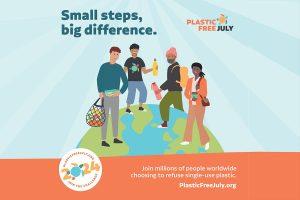Plastic Free July…did you know it was a thing? After a few recent negative encounters with plastic, research into plastic reduction in the garden brought me to Plastic Free July.
My plastic adventure started just before Easter. A box of decorations contained a thin, brittle, black film that stuck to my hands, arms and clothing. An old, black, one-use shopping bag had deteriorated into an electrostatic film that clung to everything and broke into ever smaller pieces when touched. The tiny pieces clung so tightly I finally resorted to rinsing my hands in the kitchen sink, thus introducing more micro-plastics into the water supply.
While carrying out my kitchen trash, I realized my entire waste stream was plastic. Granola, cheese, pasta, yogurt all come wrapped in plastic that isn’t recyclable.
The final straw (pun intended) came when I bought new drip irrigation fittings for the garden. All are plastic. Even metal components, such as Y fittings and spray nozzles fail when a plastic part breaks. When my soaker hose literally fell apart in my hands last year, I realized I needed to buy a new one. Yup, you guessed it, it’s made of plastic. And, all those little six-pack and four-inch pots–lightweight plastic.
Plastics contaminate our landfills and oceans, and are difficult to recycle. What can we do? Unfortunately, the solutions for outdoor plastic reduction seem to be very limited. My research took me to a new business in the Modesto area, Ecosource Refillery, where you can fill your own container with shampoo, conditioner, dishwashing liquid or laundry soap by the ounce. (Ethos, in Capitola and Los Gatos, if you happen to be in the Bay Area, is a similar type of no-waste home goods business.) The store recycles razors and packaging, plastic Taco Bell sauce packets, and specific bakery bags. But, the owner stated that she “recycles” her plastic garden pots to her father (a UCCE Master Gardener in Stanislaus County), who uses them for seed starting.
The Plastic Free July website lists the most problematic single use plastics as: plastic bags, water bottles, takeaway coffee cups, and plastic straws. Taking the Plastic Free July Challenge may help you avoid those items, but what do you do in your garden?
Actions to reduce plastic use in the garden:
- Start your own seeds, grow your own seedlings and avoid buying eye-catching young annuals in plastic containers. Create seed-starting containers from newspaper or toilet tissue tubes (instructions abound on YouTube).
- Support stores selling supplies in loose quantities
- Buy herbs and vegetable/flower plants directly from the grower at farmers’ markets.
- Take your own reusable bag or opt for no bag for simple purchases.
- Look for garden components and tools made from metal or rubber.
- Choose ceramic, clay or wooden planting containers. Or plant directly into the ground.
- Reuse, reuse, reuse. Reusing and repurposing what you have saves purchasing a new plastic item.
- And finally, contact vendors and manufacturers to request non-plastic packaging.
Let’s make an effort to return to a simpler time when plastic was not ubiquitous. Enjoy your Plastic Free July!
Rebecca Miller-Cripps is a University of California Cooperative Extension Master Gardener of Tuolumne County.

